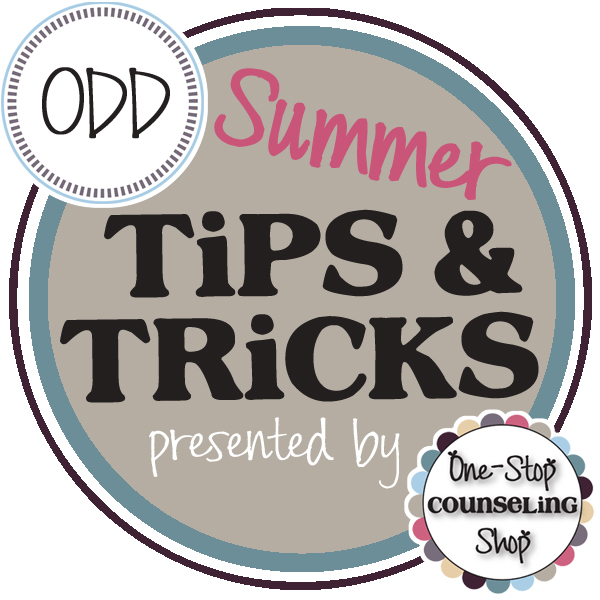
This summer, I've written a blog series focusing on several different disorders that affect children at school: ADHD, Autism, Bipolar Disorder, Depression, Anxiety Disorder, and ODD. Each entry describes the disorder, gives practical strategies for improving success at school, and also provides a few social-emotional goals and accommodations that might be appropriate for students with special education services!
Last and not least is Oppositional Defiant Disorder (ODD). Some believe that as many as 11% of males and 9% of females will meet the criteria for ODD at some point in their lives. If left untreated, children with ODD may exhibit more severe behavior as they age and may be diagnosed with Conduct Disorder or Antisocial Personality Disorder as adults. Both are characterized by a persistent pattern of behavior that violates the basic rights of others. Symptoms may include vandalism, injuring animals or others, problems with drugs or alcohol, frequent criminal activity, general lack of empathy, and violation of basic societal norms.
 Symptoms:
Symptoms:- Refuses to comply with requests or rules of an authority figure
- Does things purposefully to annoy others
- Angry and resentful of others
- Argues often
- Blames others for his or her own mistakes
- Often loses temper
- Spiteful or seeks revenge
- Touchy or easily annoyed
- Frequent temper tantrums or angry outbursts
Generally these behaviors occur across settings and not just with one particular person or authority figure, such as at home AND at school or in the community.
Suggestions:
- Contact the child's doctor if medication is to be given at school to make sure you have up-to-date dosage and administration instructions. However, don't tell a parent "your child needs to be on medication." You can encourage them to talk about concerns they may have with their child's doctor, but put your school in a vulnerable position if you start doling out medical advice!
- Behavioral therapy techniques can often be helpful with treating ODD. Doing a Functional Behavior Assessment and Behavior Intervention Plan can help the team determine why a certain behavior is occurring (what is the student getting from it?) and establish other more appropriate ways to gain that same thing.
- Avoid placing students with ODD or Conduct Disorder in therapy or intervention groups together. If students spend a lot of time around other students who have a disregard for authority and expectations, it "normalizes" the behavior and teaches them that it's acceptable to act in certain ways.
- Teach anger management skills to help students increase their frustration tolerance and learn to handle anger and frustration in safe ways.
- Provide choices as often as possible to the student to give them as much control as possible over their environment and minimize their feeling of having to "fight" for control.
- Involve students in service-learning or volunteer opportunities to help teach empathy skills. Writing apology letters when they wrong someone can also be a good way to help them begin thinking about how their actions affect others.
 Establish routines, which will help students know what to expect and feel as though they have more control over what happens to them during a day.
Establish routines, which will help students know what to expect and feel as though they have more control over what happens to them during a day.- Use positive reinforcement strategies such as allowing a student to earn free time, the opportunity to be the class "tech support" during computer time, be the line leader, etc. You can use tangible items, activity reinforcers, or social reinforcers, but use what the student desires - not just what you THINK will work for them! I've written another post about rewards and behavior management too!
- Avoid "nit picking." It creates a further dynamic of "me vs. them" and generally leads to more noncompliance. Discipline privately and help students to feel like you're working WITH them rather than against them.
- Check out my previous post about working with strong-willed students!
Sample Goals
- Sometimes, externalizing (acting out) behaviors like those seen with ODD are an exclusionary factor for qualifying a student for special education services under Emotional Disability (assuming they don't exhibit depression, anxiety, somatization or other internalizing behaviors). In some states where BD/ED is a category, this is not the case, so familiarize yourself with the criteria! The rationale is that it is a way to keep students who may tend to be aggressors (externalizing kids) away from students who tend to be victims (kids with learning or physical disabilities who may also struggle with assertiveness skills).
However, they may be eligible for special education services under other areas if they have co-existing disorders. See the other posts in this series for goal ideas to use in those situations: ADHD, Autism, Bipolar Disorder, Depression, Anxiety Disorder
Sample Accommodations:
- Give breaks or extended time if you can tell the student is having a particularly difficult day
- Provide choices for demonstrating knowledge (presentation vs. paper vs. diorama, etc.)
If you're looking for activities for your students, check out my Behavior Punch Cards, Dealing with Anger Activity Pack, Escape from Anger Volcano Game, and Student Behavior Package! You can also check out my Pinterest Boards for Behavior and Anger Management for even more ideas!
Thanks to Wikipedia for contributing to this article!




No comments:
Post a Comment